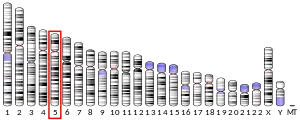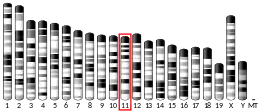ACSL6
Acyl-CoA synthetase long-chain family member 6 is an enzyme that in humans is encoded by the ACSL6 gene.[5][6][7] Long-chain acyl-CoA synthetases such as ACSL6, catalyze the formation of acyl-CoA from fatty acids, ATP, and CoA.[6]
| ACSL6 | |||||||||||||||||||||||||||||||||||||||||||||||||||
|---|---|---|---|---|---|---|---|---|---|---|---|---|---|---|---|---|---|---|---|---|---|---|---|---|---|---|---|---|---|---|---|---|---|---|---|---|---|---|---|---|---|---|---|---|---|---|---|---|---|---|---|
| Identifiers | |||||||||||||||||||||||||||||||||||||||||||||||||||
| Aliases | ACSL6, ACS2, FACL6, LACS 6, LACS2, LACS5, acyl-CoA synthetase long-chain family member 6, acyl-CoA synthetase long chain family member 6 | ||||||||||||||||||||||||||||||||||||||||||||||||||
| External IDs | OMIM: 604443 MGI: 894291 HomoloGene: 100939 GeneCards: ACSL6 | ||||||||||||||||||||||||||||||||||||||||||||||||||
| |||||||||||||||||||||||||||||||||||||||||||||||||||
| |||||||||||||||||||||||||||||||||||||||||||||||||||
| |||||||||||||||||||||||||||||||||||||||||||||||||||
| |||||||||||||||||||||||||||||||||||||||||||||||||||
| |||||||||||||||||||||||||||||||||||||||||||||||||||
| Wikidata | |||||||||||||||||||||||||||||||||||||||||||||||||||
| |||||||||||||||||||||||||||||||||||||||||||||||||||
Structure
The ACSL6 gene is located on the 5th chromosome, with its specific location being 5q31.1. The gene contains 23 exons.[5] ACSL6 encodes a 77.7 kDa protein that is composed of 697 amino acids; 10 peptides have been observed through mass spectrometry data.[8][9]
References
- GRCh38: Ensembl release 89: ENSG00000164398 - Ensembl, May 2017
- GRCm38: Ensembl release 89: ENSMUSG00000020333 - Ensembl, May 2017
- "Human PubMed Reference:". National Center for Biotechnology Information, U.S. National Library of Medicine.
- "Mouse PubMed Reference:". National Center for Biotechnology Information, U.S. National Library of Medicine.
- "Entrez Gene: acyl-CoA synthetase long-chain family member 6".
- Malhotra KT, Malhotra K, Lubin BH, Kuypers FA (November 1999). "Identification and molecular characterization of acyl-CoA synthetase in human erythrocytes and erythroid precursors". Biochem. J. 344 Pt 1 (Pt 1): 135–43. doi:10.1042/0264-6021:3440135. PMC 1220623. PMID 10548543.
- Yagasaki F, Jinnai I, Yoshida S, Yokoyama Y, Matsuda A, Kusumoto S, Kobayashi H, Terasaki H, Ohyashiki K, Asou N, Murohashi I, Bessho M, Hirashima K (November 1999). "Fusion of TEL/ETV6 to a novel ACS2 in myelodysplastic syndrome and acute myelogenous leukemia with t(5;12)(q31;p13)". Genes Chromosomes Cancer. 26 (3): 192–202. doi:10.1002/(SICI)1098-2264(199911)26:3<192::AID-GCC2>3.0.CO;2-E. PMID 10502316.
- ]Zong NC, Li H, Li H, Lam MP, Jimenez RC, Kim CS, Deng N, Kim AK, Choi JH, Zelaya I, Liem D, Meyer D, Odeberg J, Fang C, Lu HJ, Xu T, Weiss J, Duan H, Uhlen M, Yates JR, Apweiler R, Ge J, Hermjakob H, Ping P (Oct 2013). "Integration of cardiac proteome biology and medicine by a specialized knowledgebase". Circulation Research. 113 (9): 1043–53. doi:10.1161/CIRCRESAHA.113.301151. PMC 4076475. PMID 23965338.
- "Long-chain-fatty-acid--CoA ligase 6". Cardiac Organellar Protein Atlas Knowledgebase (COPaKB).
External links
- Human ACSL6 genome location and ACSL6 gene details page in the UCSC Genome Browser.
Further reading
- Soupene E, Kuypers FA (2006). "Multiple erythroid isoforms of human long-chain acyl-CoA synthetases are produced by switch of the fatty acid gate domains". BMC Mol. Biol. 7: 21. doi:10.1186/1471-2199-7-21. PMC 1543647. PMID 16834775.
- Kang H, Lee SK, Kim MH, et al. (2009). "Acyl-CoA synthetase long-chain family member 6 is associated with premature ovarian failure". Fertil. Steril. 91 (4 Suppl): 1339–43. doi:10.1016/j.fertnstert.2008.03.035. PMID 18555221.
- Nagase T, Ishikawa K, Suyama M, et al. (1998). "Prediction of the coding sequences of unidentified human genes. XII. The complete sequences of 100 new cDNA clones from brain which code for large proteins in vitro". DNA Res. 5 (6): 355–64. doi:10.1093/dnares/5.6.355. PMID 10048485.
- Ma J, Dempsey AA, Stamatiou D, et al. (2007). "Identifying leukocyte gene expression patterns associated with plasma lipid levels in human subjects". Atherosclerosis. 191 (1): 63–72. doi:10.1016/j.atherosclerosis.2006.05.032. PMID 16806233.
- Mashek DG, Bornfeldt KE, Coleman RA, et al. (2004). "Revised nomenclature for the mammalian long-chain acyl-CoA synthetase gene family". J. Lipid Res. 45 (10): 1958–61. doi:10.1194/jlr.E400002-JLR200. PMID 15292367.
- Murati A, Adélaïde J, Gelsi-Boyer V, et al. (2006). "t(5;12)(q23-31;p13) with ETV6-ACSL6 gene fusion in polycythemia vera". Leukemia. 20 (6): 1175–8. doi:10.1038/sj.leu.2404194. PMID 16572202.
- Luo XJ, Diao HB, Wang JK, et al. (2008). "Association of haplotypes spanning PDZ-GEF2, LOC728637 and ACSL6 with schizophrenia in Han Chinese". J. Med. Genet. 45 (12): 818–26. doi:10.1136/jmg.2008.060657. PMID 18718982. S2CID 206999081.
- Chen X, Wang X, Hossain S, et al. (2006). "Haplotypes spanning SPEC2, PDZ-GEF2 and ACSL6 genes are associated with schizophrenia". Hum. Mol. Genet. 15 (22): 3329–42. doi:10.1093/hmg/ddl409. PMID 17030554.
- Denoeud F, Kapranov P, Ucla C, et al. (2007). "Prominent use of distal 5′ transcription start sites and discovery of a large number of additional exons in ENCODE regions". Genome Res. 17 (6): 746–59. doi:10.1101/gr.5660607. PMC 1891335. PMID 17567994.
- Edwards TL, Wang X, Chen Q, et al. (2008). "Interaction between Interleukin 3 and Dystrobrevin-Binding Protein 1 in Schizophrenia". Schizophr. Res. 106 (2–3): 208–17. doi:10.1016/j.schres.2008.07.022. PMC 2746913. PMID 18804346.
- Chowdari KV, Northup A, Pless L, et al. (2007). "DNA pooling: a comprehensive, multi-stage association analysis of ACSL6 and SIRT5 polymorphisms in schizophrenia". Genes Brain Behav. 6 (3): 229–39. doi:10.1111/j.1601-183X.2006.00251.x. PMID 16827919. S2CID 44288193.
- Ota T, Suzuki Y, Nishikawa T, et al. (2004). "Complete sequencing and characterization of 21,243 full-length human cDNAs". Nat. Genet. 36 (1): 40–5. doi:10.1038/ng1285. PMID 14702039.
- Strausberg RL, Feingold EA, Grouse LH, et al. (2002). "Generation and initial analysis of more than 15,000 full-length human and mouse cDNA sequences". Proc. Natl. Acad. Sci. U.S.A. 99 (26): 16899–903. Bibcode:2002PNAS...9916899M. doi:10.1073/pnas.242603899. PMC 139241. PMID 12477932.
- Wang L, McDonnell SK, Hebbring SJ, et al. (2008). "Polymorphisms in mitochondrial genes and prostate cancer risk". Cancer Epidemiol. Biomarkers Prev. 17 (12): 3558–66. doi:10.1158/1055-9965.EPI-08-0434. PMC 2750891. PMID 19064571.
This article is issued from Wikipedia. The text is licensed under Creative Commons - Attribution - Sharealike. Additional terms may apply for the media files.



